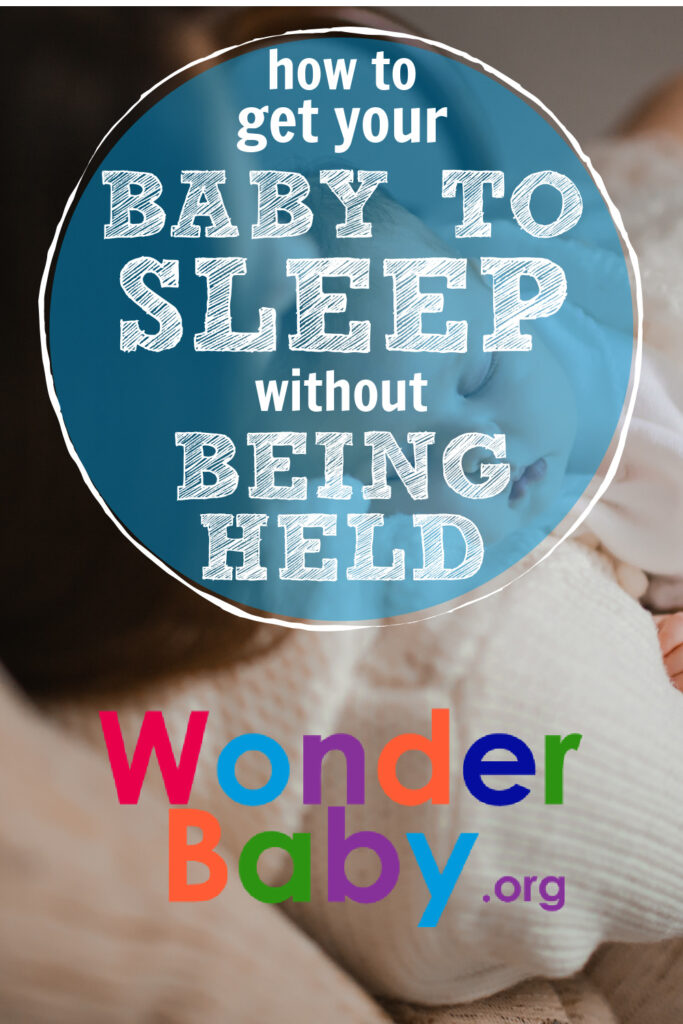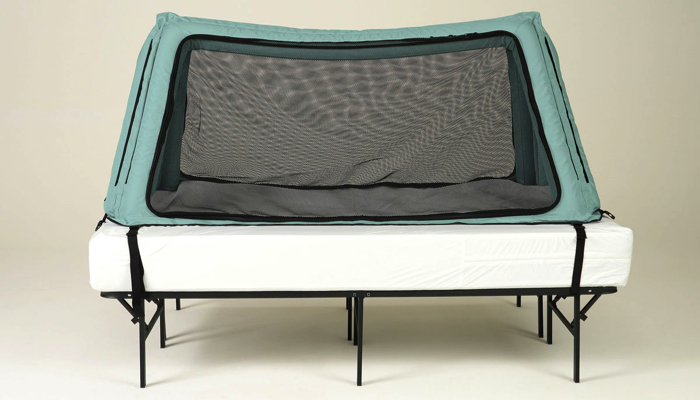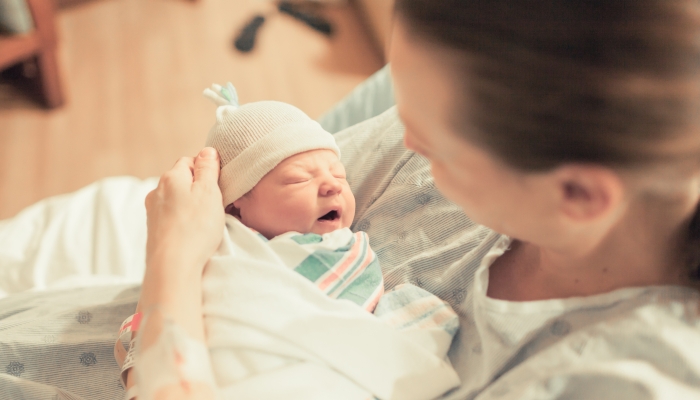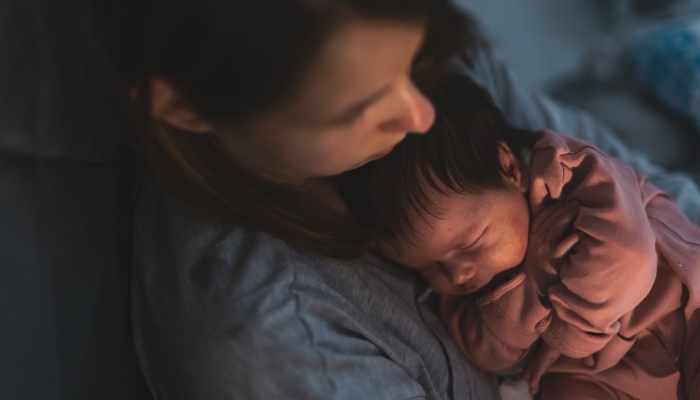How to Get Your Baby to Sleep Without Being Held

This post may contain affiliate links; please see our terms of use for details.
- It’s natural for a newborn to want to sleep cuddled in your arms, but it’s also important that they start learning to fall asleep independently before it becomes a habit.
- There are many gentle strategies that you can try with your baby to teach them to settle into sleep without being held or rocked.
- Teaching your newborn to sleep independently is essential for their safety and ensuring that you get enough sleep.
Your baby falls asleep in your arms or on your chest like a sweet little angel. You lower them down into their crib as gently as you can. But of course, they start crying within seconds—even before they feel the mattress underneath them. And it seems like nothing can stop the crying, except for picking them back up and holding them to repeat the cycle. Sound familiar?
So many new parents face this situation in the early days of parenting. And when you’re sleep-deprived and tired yourself, all you want is for the crying to stop and for your baby to sleep for a few hours. But here’s some good news: It’s possible to get your baby to sleep without being held and to help them sleep independently so that your whole family can start to sleep soundly.
Why Won’t My Baby Fall Asleep Without Being Held?
There are several reasons why many babies, especially newborns, won’t fall asleep without being held.
- Babies want to be close to you.
After spending nine months curled up safely in the womb, it’s natural for newborn babies to crave the warm coziness they feel when they’re resting in your arms or on your chest. All babies need to be held to feel safe and connected to their caregivers. But when your baby won’t sleep unless they’re held, it’s become a habit that you will need to address.
- Babies go through many physical changes and want parental comfort.
Babies experience a lot of change, both physically and in their environment. Sometimes this input can be overwhelming, especially for newborns. When babies feel physical discomfort or experience too much stimulation, they need sleep to recover. Otherwise, you risk an overtired baby, leading to other sleep problems. Being held while sleeping may be comforting to them in times of transition.
- Your baby associates sleep with being held.
If you’ve been letting your baby sleep in your arms since the newborn stage, then they probably associate the sensation of being held with sleep. If your baby doesn’t sleep for more than a few minutes without being held, you will have to change this association over time to help them fall into a deep sleep independently.

How To Get Your Baby To Sleep Without Being Held
While sleep-deprived new parents may find this hard to believe, there are strategies you can try to help your baby start learning to sleep without being held. It’s important to teach your newborn this skill.
While it may be sweet to watch your sleeping baby in your arms in the early days, it’s not safe to let your baby sleep this way regularly. If you fall asleep while holding them, it can lead to accidents like dropping your baby. Adult beds are not safe for infants because of the risk of suffocation. Babies should sleep in a crib or bassinet in your room for at least the first six months to reduce the risk of SIDS.
If your newborn won’t sleep without being held, try these tips:
- Establish a bedtime routine.
Start using a consistent bedtime routine. Your routine should include quiet activities that won’t overstimulate your baby, like bathing, reading, or singing. Play music quietly. Your routine should have an ending that signals to your baby that it’s time for you to leave the room and for them to go to sleep.
- Put your baby down drowsy but awake.
Try putting your little one in their crib or bassinet while they’re drowsy but awake. This will help your baby associate their bed, rather than your arms, with sleep. Over time they will also learn to fall asleep by themselves, without needing to be held.
- Try a pacifier.
Some parents find that a pacifier can help soothe a baby learning to sleep without being held. The Mayo Clinic reports that using a pacifier during sleep can help reduce the risk of SIDS. However, be aware that just like falling asleep while being held, some babies may rely on the pacifier for sleep and wake up every time it falls out.
- Keep night feedings calm.
If your baby is still waking at night to feed, keep things calm and quiet, without too much talking or bright lights. Help your baby understand that nighttime is bedtime all night long.
- Create new bedtime associations.
To make the transition from sleeping while you hold them to sleeping in their bed easier for your baby, help them make new associations with bedtime. Try adding white noise to help calm your baby if they’re fussing while falling asleep. White noise mimics the sound of the womb, and many babies find it soothing.
Should I Sleep Train My Baby?
Many parents are inundated by advice from everyone around them about sleep training methods when their baby isn’t sleeping or wakes a lot at night. But the concept of sleep training can also feel overwhelming for new moms and dads.
Simply put, sleep training is a group of strategies that help babies sleep independently. They include gentle approaches like the Pick Up Put Down method, which involves shushing and patting your baby’s back until they fall asleep in their crib and then returning to them and even picking them up if they wake, as many times as it takes. But they also include more structured techniques like the Ferber method and crying it out.
When it comes to sleep training your baby, not every method will work for every mom or dad or every little one. If you want to try sleep training, the American Academy of Pediatrics recommends that you wait until your baby is about four to six months of age. By this time, they’re out of the newborn stage, have more consistent naps, wake less for night feedings, and are developmentally ready.

FAQs
Most babies will begin to learn to self-soothe by around four months, making it easier for them to fall asleep independently. Their circadian rhythms also begin to mature around this time, creating more regular sleep-wake cycles.
If you always hold your child until they fall asleep, they will connect sleeping to being held, and it may be difficult for learn to sleep without being held. You should also pay attention to your baby’s cues. Try putting your baby down and patting or rubbing their back to soothe them to help them get to sleep rather than holding them. When my son was about five months old, I realized that he was crying at bedtime because he wanted to be put down. Holding and rocking him was too stimulating for him and kept him from getting to sleep.
It’s not unusual for a newborn baby to have erratic sleeping patterns. Many babies continue to wake every three to four hours throughout the day and night for the first few months. Most babies do not develop a consistent sleep pattern until around three to six months, at which point they will begin to sleep through the night. So if it’s hard to get your newborn to sleep on their own, know that it can take a while before your baby sleeps in a regular pattern.
Not necessarily. What works at one stage of your baby’s life may not work at another. Your child will change their sleep patterns as they grow. Newborn babies need much more daytime sleep than older babies. Also, your baby will go through teething, illnesses, and growth spurts, affecting their sleep. But if your baby suddenly goes from sleeping through the night to waking every two hours, try changing your routines and get advice from your doctor. You and your baby will eventually find what works for everyone in the family to get a good night’s rest.

The information WonderBaby provides is not intended to be, and does not constitute, medical or other health advice or diagnosis and should not be used as such. Always consult with a qualified medical professional about your specific circumstances.
Related Posts

Sleep, Special Needs
Safe Place Bedding Travel Bed Review
Traveling with a special needs child can be stressful! Having a safe, durable, and easy to use travel bed can make traveling so much easier!

Sleep, Special Needs
Sleep Regimen for Premature Babies: Special Considerations
It can take premature babies much longer than their full-term peers to sleep for long stretches. A preemie sleep schedule may encourage better sleep.

Sleep
Mastering the Bedtime Routine: 3 Tips for a Peaceful Night’s Sleep
From around six weeks, a newborn bedtime routine can help your baby learn the difference between day and night and prepare for a restful night’s sleep.